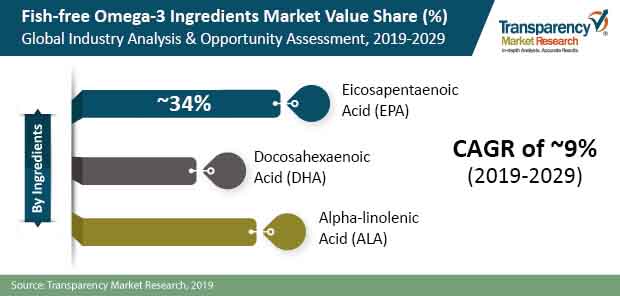
The latest market forecast report published by Transparency Market Research on the fish-free omega-3 ingredients market includes the global industry analysis and opportunity assessment for the period of 2019-2029. Revenue generated from the global fish-free omega-3 ingredients market has been estimated to be valued at ~ US$ 590 Mn in 2019, which is projected to increase at a CAGR of ~ 9%, to reach a value of ~ US$ 1.3 Bn by 2029.
Request Brochure:
https://www.transparencymarketresearch.com/sample/sample.php?flag=B&rep_id=68579
Vegans & Vegetarians Demand Fish-free Omega-3 Ingredients and Supplements
All three types of omega-3 are important, but evidence shows that, DHA and EPA have unique benefits, especially for boosting brain health, reducing inflammation, and improving retinal health. For vegans (vegetarians who eat food derived only from plant sources) and vegetarians, it is difficult to get adequate amounts of omega-3 fatty acids in their diet, as the two essential omega-3 fatty acids, DHA (docosahexaenoic acid) and EPA (eicosapentaenoic acid), are mostly derived from fish and animal sources. Omega-3 ingredients derived from plant sources only contain ALA (alpha-linolenic acid), which is a precursor form that gets converted to DHA & EPA inside the body.
Since there are not many sufficient vegan food sources of EPA and DHA, those who follow a vegan diet often have lower levels of these fatty acids in their blood. Therefore, keeping vegan and vegetarian diets in mind, manufactures are developing products from algal oil or plant-based products such as chia seeds, flaxseed oil, canola oil, hemp seeds, walnuts, and others, which are growing as fish-free omega-3 ingredients.
More Trending Reports by TMR:
Growing Need for an Alternative to Fish-derived Omega-3 Ingredients
Many fish-derived oil supplements in the market are rancid, i.e. oxidized. Rancid oils/fats can damage cells and contribute to atherosclerosis. Free radicals from rancid oils are known to damage DNA cells. Free radicals are produced by toxins as well as by normal bodily processes, and can cause damage to the arteries and also act as carcinogens.
Fat-soluble pollutants such as polychlorinated biphenyls may biomagnify in marine food chains and end up in concentrated amounts in fishy oil supplements. This accumulation is causing contamination and fastening the process of oxidation of supplement oils/ fats.

Demand for Algae-based Omega-3 Supplements Expected to Grow Rapidly
Fish are the major source of omega-3 for the production of various supplements. Fish obtain omega-3 by consuming algae. Therefore, the usage of algae as a new alternative source to fish is anticipated to grow rapidly in the fish-free omega-3 ingredients market.
Supplements developed from algal oil have the same omega-3 benefits and nutritional content as fish-derived oils. Algal oil is free from contaminants such as heavy metals, bio-accumulated toxins, and pollutants. Vegan diets lack EPA and DHA, which can consumed through supplement products manufactured from algal oil.
Buy Now:
https://www.transparencymarketresearch.com/checkout.php?rep_id=68579<ype=S
Omega-3 – Preferred Ingredient in Convenience and Processed Foods
Increasing health awareness and growing preference for processed food/diets with low fat, sugar, and salt content among consumers are factors expected to prompt the manufacturers of food & beverages to review current marketing practices and adopt new techniques to increase their revenue shares in the fish-free omega-3 ingredients market.
- In May 2004, the World Health Organization (WHO) initiated a global strategy on diet, physical activity, and health, and provided certain recommendations to the food & beverages industry, which included limiting the levels of saturated fats, trans-fatty acids, free sugars, and salt in existing products, and promoting healthy and nutritious products.
In North America, the millennial demographic constitutes a large share of the consumption of ready-to-eat and processed food products. The consumption of take-away food has also risen considerably due to its convenience, which is further expected to drive the growth of the fish-free omega-3 ingredients market during the forecast period.
Fish-free Omega-3 Ingredients Market: Tedious Process of Regulatory Approval
The restraining factor for the fish-free omega-3 ingredients market is slow regulatory approval for health claims. For medicines and drugs, after clearing the phase III trial, approval for prescription takes another six to twelve months. There are various steps included for the drug to be approved for prescription, which include the discovery and development process that begins in the laboratory. During the second step, drugs undergo laboratory and animal testing to clear basic safety questions. The third step involves clinical research, where drugs are tested on people to make sure they are effective and safe. Later, an FDA examination takes places for the final approval. For any drug, supplement, or medicine, it usually takes around 10 years to be developed and approved for prescription. So, in order to sanction any sort of health claim, the wait is quite long, which hampers the growth of the fish-free omega-3 ingredients market, significantly.





